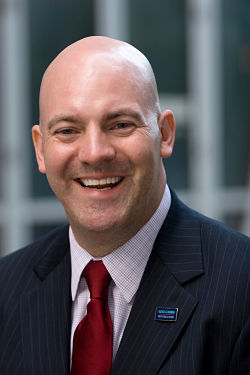It wasn't long after the first polls closed on the East Coast on election night that Republicans knew something was wrong.
First Michigan was called for President Barack Obama, the same state where Mitt Romney's father, George Romney, served as a popular governor during the 1960s. Then Pennsylvania also went to Obama, despite a last-ditch effort by the Romney campaign that had the Republican nominee in the state just hours before the polls closed.

Jimmy LaSalvia
(Photo by Todd Franson)
Things really began to look grim for Romney supporters when polls in Florida and Virginia, two states critical for a Romney victory, showed Obama and Romney in a dead heat.
It was 11:12 p.m. — 12 minutes later than when the presidential race was called in 2008 — when NBC News declared Obama the winner in the swing state of Ohio, announcing that the president would win re-election. Other networks soon followed, including Fox News, which was being broadcast before a few hundred people at the Romney election-night party in Boston. Footage of the Romney event showed a crowd in disbelief.
What happened? That's the question Republicans have been asking in the wake of sweeping defeats on Nov. 6 that have left party faithful in despair and party leaders debating the future of the GOP.
PICKING UP THE CAMPAIGN PIECES
''The president won an extraordinary victory, and the fact is we owe him the respect of trying to understand what they did and how they did it,'' former Republican presidential candidate Newt Gingrich said during an appearance on NBC's Today Show. ''But if you had said to me three weeks ago that Mitt Romney would get fewer votes than John McCain — and it looks like he'll be 2 million fewer — I would have been dumbfounded.''
Indeed, having been declared the winner of Florida almost a week after Election Day, Obama won 332 electoral voters compared to Romney's 206, and 50.6 percent of the popular vote compared to Romney's 47.8 percent.
Although it is debatable if such a divided country translates to a mandate for the president, particularly as Republicans maintained their majority in the House of Representatives, the 2012 election signals a shift in public opinion that is undeniable.
Not only was the first sitting president ever to openly endorse same-sex marriage re-elected, the number of out members of Congress nearly doubled, and in four states marriage equality won at the ballot box – a game-changing first.
For Republicans, the rebuke of their presidential candidate as well as their vision for the future comes as a disappointment, but it also comes as an opportunity, particularly for gay Republicans, who see a political party at a crossroads.
''There will be some messy, ugly discussions that happen over the next couple of years, but in the end I think this is a good opportunity for Republicans,'' GOProud Executive Director Jimmy LaSalvia tells Metro Weekly.
Although LaSalvia says he was frustrated throughout the election cycle, he expresses optimism that this was the beating Republicans needed to wake up and change direction on LGBT rights.
''The Republican Party has an element in it that just doesn't like gay people. Period. For a long time that small segment of the party has had more power than they should, given their size,'' says LaSalvia. ''I'm not saying social conservatives shouldn't be a part of the party, but the anti-gay crowd has lost. And until party leadership understands that, the party will continue to lose.''
Republican Party leaders seem well aware of the message sent by the election's result. The same year that saw the Republican Party adopt a national platform openly hostile to gay people also saw Senate candidates like Todd Akin of Missouri and Richard Mourdock of Indiana draw outrage because of their comments over ''legitimate'' rape and whether pregnancies caused by rape are part of God's plan.
In an opinion piece published by Politico, Karen Hughes, who served as an advisor to President George W. Bush, issued a graphic warning to the Todd Akins of the Republican Party.
''And if another Republican man says anything about rape other than it is a horrific, violent crime, I want to personally cut out his tongue,'' Hughes wrote after the election. ''The college-age daughters of many of my friends voted for Obama because they were completely turned off by Neanderthal comments like the suggestion of 'legitimate rape.'''
"We have a period of reflection and recalibration ahead for the Republican Party," added Sen. John Cornyn (R-Texas) in a statement released shortly after the election was called on Tuesday.
NAVIGATING THE NEXT MOVE

R. Clarke Cooper
(Photo via twitter @RClarkeCooper)
According to Log Cabin Republicans Executive Director R. Clarke Cooper, several groups are set to convene over the next few weeks with Republican Party leadership around the country in order to address what is seen as a growing identity crisis for the Grand Old Party.
The Republican base is shrinking, as exit polls demonstrated.
LGB voters made up 5 percent of the electorate this election, 76 percent of whom voted for Obama. Exit polls also showed a growing gender gap with 55 percent of women voting for Obama.
Romney lost the youth vote and the Hispanic vote as well. With the country's immigrant population growing steadily, the fact that Obama won 71 percent of the Hispanic vote, up from 67 percent in 2008, is an issue worth worrying about. Moreover, a majority of each of those demographics supports marriage equality.
''We have yet to have somebody emerge in the Republican Party and say, 'Enough,''' says Cooper. ''You don't have to be the director of Log Cabin to look at how our teeth got kicked in on Tuesday and know something's gotta give.''
Up until Log Cabin Republicans, the largest LGBT Republican organization, issued a ''qualified endorsement'' for Romney two weeks before Election Day, GOProud was the only group of gay conservatives to endorse Romney for president, having declared their support for the Romney-Ryan ticket in June despite his support for a constitutional amendment banning same-sex marriage.
A week after Election Day, Romney campaign signs and bumper stickers still dot the walls of GOProud's offices in the basement of a Capitol Hill townhouse.
''We can throw this away,'' LaSalvia says as he crumples up a page of Romney campaign contacts.
For months, LaSalvia and GOProud argued that a vote for Romney was ultimately in the best interest of gay people because of his economic vision. In the end, a majority of voters disagreed, with the LGB electorate among Obama's strongest supporters. Today, more than ever before, that 5 percent of the electorate is communicating their views on LGBT issues to friends and families, potentially influencing millions of voters.
''The message of this election was jobs and the economy, but you also have to appear to be a normal person, too. People want to know that you understand how issues affect them and that you've thought about it,'' says LaSalvia. ''Most Americans are willing to vote for somebody they disagree with on some specific issues – they just want to know that you get it. And Mitt Romney wasn't able to show that he gets it. And Republicans all over the country demonstrated that some of them don't get it. It tainted the entire party in the last election.''
FAR RIGHT DOUBLES DOWN
While gay conservatives see a door opening for their role in the Republican Party, anti-gay conservatives are on the defensive as they try to keep that door closed.
Family Research Council President Tony Perkins and National Organization for Marriage President Brian Brown have both scrambled to regain control of their message after Election Day, assuring supporters and donors that sweeping defeats for their side on marriage-equality ballot measures in Maryland, Maine, Washington and Minnesota were merely a setback.
Appearing on the American Family Association Channel, Perkins declared statements by activists that Election Day's sweep of victories was a watershed moment for the LGBT-rights movement to be unfounded. Moreover, according to Perkins, any ruling by the Supreme Court that declares the discriminatory Defense of Marriage Act unconstitutional, which could be influenced by Nov. 6 victories, would leave Americans as divided as after the 1973 Roe v. Wade ruling.
''I think if the court steps in at this moment and says, 'We're redefining marriage, same-sex marriage will be the law in every land,' I'll tell you what, I think you will create a firestorm of opposition,'' Perkins said.
Noting continued divisions over abortion four decades after the Supreme Court upheld a woman's right to choose, Perkins continued: ''When you look at a nation that is so divided along these moral and cultural issues, that you could have, I hate to use the word, but a revolt, a revolution. I think you could see Americans saying, 'You know what, enough of this,' and I think it could explode and just break this nation apart."
According to Cooper, any theory that Romney or the Republican Party ran as too moderate is simply not the case.
''We didn't lose because Americans want to spend more money. We didn't lose because the American populace wants to go deeper in debt. We lost because our party was perceived as exclusionary and targeting particular minority groups,'' says Cooper.
Adds LaSalvia, ''Ten years ago there was a different political reality, and there were people like me in the Republican Party who were told to shut up and deal with the political reality. So that's my message to Tony Perkins: 'Shut up and deal with the political reality on this issue.'''
RIGHT'S TUESDAY TAKEAWAY
Despite Perkins's violent rhetoric, few can look at the results from this past election and argue that times are not changing. Polls continue to show shifting public opinion on the issue of same-sex marriage. And following the four ballot measure wins, activists hope to carry that momentum into more states.
It was only eight years ago in 2004 that President George W. Bush ran for re-election, leaning heavily on his support for amending the Constitution to ban same-sex marriage. In the process, he won the state of Ohio. Although the wedge issue that once was same-sex marriage has lost its edge, it has now been replaced with silence from Republicans on LGBT issues. That too appears to be changing.
''Both parties should be vying for the votes of the LGBT community and our allies,'' said Human Rights Campaign President Chad Griffin in a statement. ''With the growing breadth and depth of our electoral power, no one should take our votes for granted.''
While some in the GOP have sought to exclude gay people from their party, gay Republicans argue for conservative principles that oppose government interjecting into the personal lives of Americans; that with changing demographics in key swing states and broadening support for same-sex marriage, the party's message must change. Failure to do so could prove catastrophic for the future of the GOP. As Cooper notes, American political parties have died in the past.
Although few expect the Republican Party to make a sudden declaration of support for LGBT rights, at a minimum gay conservatives argue that party leaders must at least show some knowledge of the issues that specifically affect LGBT Americans, including marriage equality and workplace protections.
Says LaSalvia, ''Sometimes you have to hit rock bottom before you can fix what's wrong. And I think the Republican Party is about there.''
...more